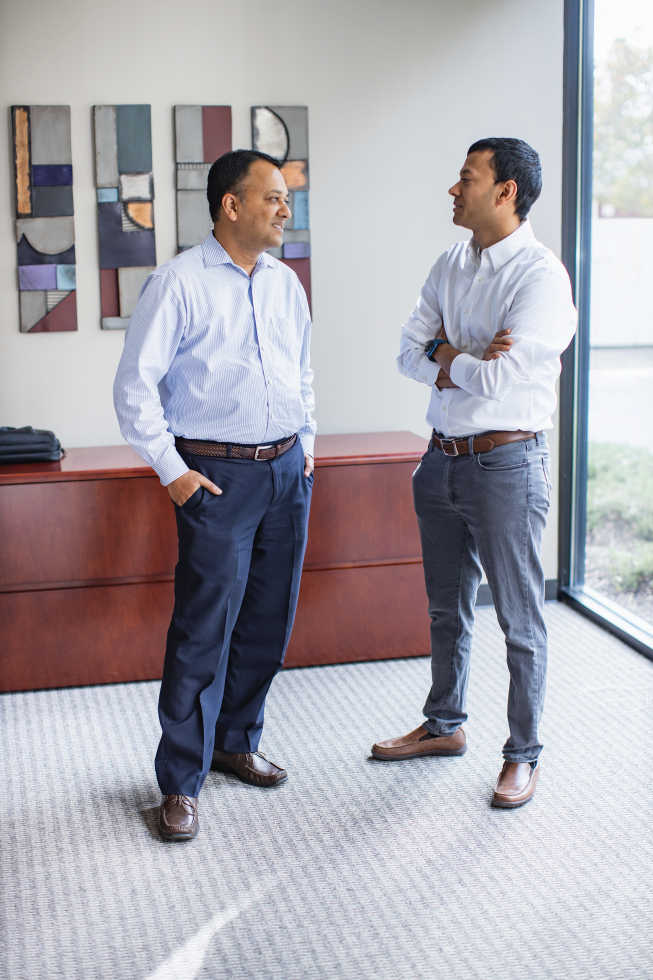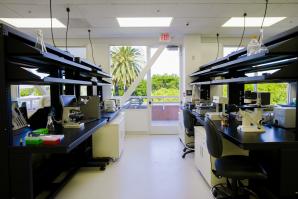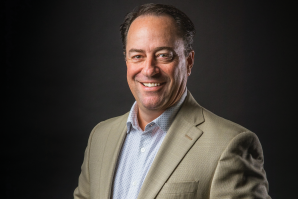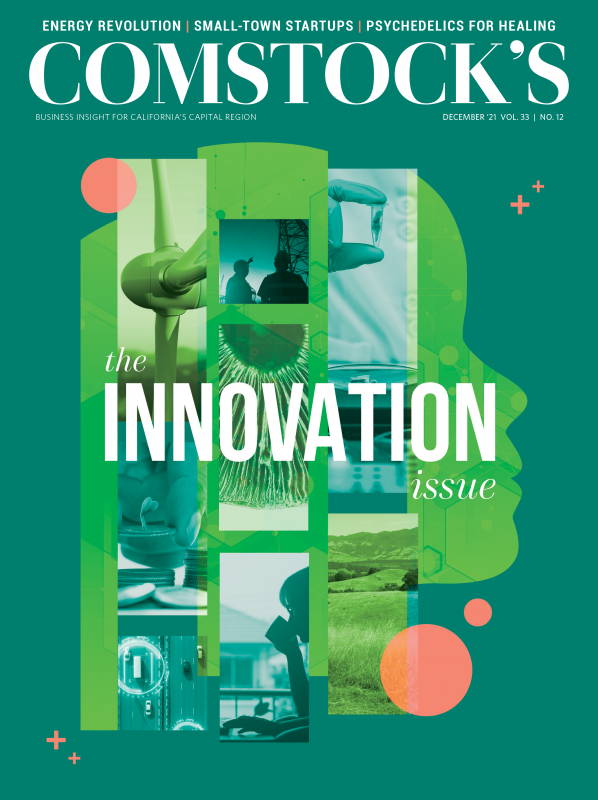It was a big risk for Hemant Sikaria to be driving.
In 2017, his car had been recalled for software issues. This wasn’t like a phone you could plug in overnight to install updates. With 50 to 150 microcontrollers, vehicles need a higher level of coordination for performing software updates to avoid being a safety hazard. But the dealership, overrun with repair orders, couldn’t service his car right away.
“We knew we were driving something that was not safe,” he says, “but we had no choice.”
Even after that problem was fixed, he says, two more recalls occurred in a year and a half. In 2018, these technical difficulties (plus his prior experience working at Tesla) inspired Sikaria to launch Sibros, a technology startup developing a connected vehicle platform that provides software updates and event-based data collection to improve the safety, security and reliability of vehicles. But, of course, the business wasn’t going anywhere without funding.
“It becomes a chicken-and-the-egg problem. I need money to build my product, but I need to build my product to make money. The only way out is to take investment.”
Hemant Sikaria, CEO and cofounder, Sibros
“It becomes a chicken-and-the-egg problem,” says Sikaria, the CEO and cofounder of Sibros, which has offices in Sacramento and San Jose. “I need money to build my product, but I need to build my product to make money. The only way out is to take investment.”
The past 20 months have been a wild ride for businesses all over the globe. But investors are clearly willing to take risks on startups showing promise — venture capital is breaking records in the U.S. and globally. In the first two quarters of 2021, $280 billion has been raised worldwide for venture capital, compared to $275 billion in all of 2020.
Last year also saw the return of the SPAC, (Special Purpose Acquisition Company) a blank check company with no specific business plan except to finance mergers and acquisitions as an alternative route to an initial public offering. These types of deals used to be a back-of-the-shelf financial model, but in 2020 they spearheaded a record year for IPOs.
Hemant Sikaria (right) launched Sibros, a technology startup to
help improve the safety and reliability of vehicles, in 2018 and
found an early investor in Folsom-based Moneta Ventures, of which
his brother Lokesh Sikaria (left) is a founding partner. Moneta
Ventures invested about $1 million in the startup’s seed round.
(Photo by Wes Davis)

In June, Origin Materials, a West Sacramento-based green tech company that uses patented techniques to convert wood chips into renewable plastics to replace petroleum-based materials, completed a nearly $1 billion merger with a SPAC.
“Even though it’s called the VC market, more and more of that money is not from VC investors,” says Ayako Yasuda, professor of finance at the UC Davis Graduate School of Management and Research Fellow of the Private Equity Research Consortium. “That’s something we’ve never seen before.”
As global venture capital investments continue to demolish records, U.S. private equity firms have flocked to early-stage startups in specialized areas, such as automation and ag-tech, which puts the Capital Region in a prime position for growth.
Following the Money
There are four types of private equity investment: angel, venture capital, growth equity and buyout. In the Capital Region, you have the big funds with pools of $50 million or more, including Moneta Ventures, CVF Capital Partners and DCA Partners. Then you have the newer funds such as the Growth Factory and the Black Star Fund. Each fund has its own interests and invests at varying stages, but if you follow the money, common trends emerge.
The region’s notable startups in the past two years have adapted to new changes, some benefiting from people staying at home and needing software to collaborate remotely, according to Lokesh Sikaria, founding partner at Moneta Ventures, a Folsom-based venture capital firm, and Hemant Sikaria’s brother (more on that later). Companies that manufacture locally also look more appealing to investors in this economy. Quality and cost still need to be competitive, he says, but reshoring reduces the risk of a company going belly up due to a disrupted supply chain.
According to Steve Mills, a partner at DCA Partners, another factor shifting investment tides is the silver tsunami. Baby boomers are leaving the workforce and typically don’t have family members that want to take over their businesses. These senior entrepreneurs want liquidity, Mills says. DCA usually invests smaller amounts (in the $3 million to $7 million range) in companies at the later stages, which may include buyouts. To that end, DCA’s primary competitor is banks. But unlike banks, Mills points out that DCA doesn’t just hand over a check but offers managerial support from a team that has business experience.
Every partner at DCA has been a C-level executive, he says, which means they know what it’s like to be on the other side of the table. They use a traditional approach to valuation, which considers growth rates, margins and cash flow. The pandemic has, without a doubt, impacted valuation whether entrepreneurs admit it or not.
“A lot of business owners want to ignore the fact that 2020 and most of 2021 have been lost years,” Mills says. “They are basically treating the last 18 months as if they didn’t happen and pegging their valuation expectation on 2019 performance. Obviously, there is some tension between investors and business owners in that regard.”
Power Shift
Valuation isn’t the only source of tension. When a company raises a VC round, a lead investor of the round often takes a board seat and influences the direction of the company via his or her vote and veto power. These days, bargaining power has tilted away from investors toward founders and entrepreneurs who have more choices in where to get funds.
Everybody wants a piece of the VC pie: private equity firms, corporate VC, even mutual and hedge funds — which traditionally invest in companies that have already gone public — are joining the VC bandwagon. This surge fuels the market even more because with more money available, companies can stay private for longer.
“For a long time, VCs had a lot of bargaining power,” Yasuda says. “But this trend is still accelerating and I see more and more founders negotiating and declining offers from even top VC firms in order to retain more of, not just the money, but the decision-making power within the company.”
“I see more and more founders negotiating and declining offers from even top VC firms in order to retain more of, not just the money, but the decision-making power within the company.”
Ayako Yasuda, professor of finance, UC Davis Graduate School of Management
In the Capital Region, the ag-tech sector within the VC market has been a real success story, gaining traction throughout the pandemic as other industries stalled. One example in the Capital Region is Advanced Farm Technologies, which already had momentum heading into 2020. In 2018, the Davis-based startup raised $2 million in its seed equity round (from Catapult Ventures in the Silicon Valley and Impact Venture Capital based in Sacramento) for the development of robotic tractors that harvest strawberries. Series A funding brought in another $7.5 million, led by Yamaha Motor Ventures and Laboratory Silicon Valley with additional investments from Kubota Corporation. After growing from 12 to 40 people, this summer Advanced Farm Technologies raised $25 million in a Series B round to support the creation of apple-picking robots.
“It’s been a wild world in general, but we’ve been fortunate to be in a sector that hasn’t stopped working,” says Kyle Cobb, president, CFO and cofounder of Advanced Farm Technologies. “Agriculture was prioritized, if anything. Robotics was the best place we could have chosen to be if we had a crystal ball back then.”
The global pandemic led big thinkers to reevaluate the food system. Automation and sustainability became concepts with real-world, problem-solving potential as the industry faced challenges with labor and supply chain disruptions. Because of this, Cobb says investors with an interest in disruptive technology were drawn to ag-tech. In the same vein, Yasuda expects climate change to continue to be a huge driver of investments.
“I think we could play a bigger role in climate change-related investment, whether it is a startup or PE (private equity) investment,” Yasuda says. “That means Sacramento, as the seat of the state, will implement big policy change. Any time there’s a big policy change, that opens the door for new business opportunities.”
Growth Potential
The Capital Region has come a long way, but still has a ways to go, says Edris Bemanian, CEO of Engage3, a Davis-based startup that uses big data and artificial intelligence to measure and optimize price image (how consumers perceive a company’s prices relative to the competition) in retail. Five to 10 years ago, he says, locally-based options for financing startups were minimal. This presents a challenge for any startup trying to get off the ground.
From the investors’ perspective, with so many different companies out there, they have to pick and choose where to focus. They rely on their eyes and ears in the market “to identify diamonds in the rough,” Bemanian says. Founders and investors in the same region might have overlapping networks, which makes it easier for them to find each other. Not that it’s impossible to get financial backing beyond your home base. Entrepreneurs do it all the time. But a startup’s location might deter some investors. Case in point: Bemanian recalls people in San Francisco telling him flat-out that if they couldn’t bike to his office, they weren’t interested.
“The fact that you have to defend why the state capital is a great place to launch a startup is kind of befuddling.”
Edris Bemanian, CEO, Engage3
The thinking was, “If you’re not here, you’re in Podunk, Nowhere,” he says. “The fact that you have to defend why the state capital is a great place to launch a startup is kind of befuddling.”
In many ways, COVID-19 helped dissolve geographical boundaries. With virtual meetings and online communication bigger than ever, the “where” became less important than the “what.” Engage3 raised $12 million in Series C financing, with two investors, Moneta Ventures and The March Fund, based jointly in Davis and Hong Kong, which invests in breakthrough technologies around food and global health. As Engage3 enters the growth equity stage, Bemanian isn’t familiar with nearly as many options based in Sacramento. But he looks forward to a future when more private equity firms choose the region as its base and those outside the region are no longer deterred by the location.
As for Hemant Sikaria, he didn’t have to look far for support with his brother Lokesh at Moneta Ventures. But it would have been a conflict of interest for Lokesh to be involved, so he brought the opportunity to the investment board and removed himself from the process. The committee saw potential in Sibros, investing about $1 million in its seed round. Now, Sibros is fundraising for a Series B, looking to raise $50 million by year’s end. The Sikaria brothers believe in the potential of Sibros, but both admitted feeling pressure for the startup to perform well. For younger brother, Hemant, he worried that failure would impact the reputation his brother worked to build.
“My brother is 16 years older than me, very well established in his career and well known in the Sacramento Region,” Hemant says. “Since his VC firm was an early investor in Sibros, maintaining and building his reputation and making him proud have always been key drivers for me and that continues to help me achieve greater heights.”
–
Stay up to date on business in the Capital Region: Subscribe to the Comstock’s newsletter today.
Recommended For You

Powering Through the Pandemic
Local governments pull out all the stops to keep their economies rolling
Some solutions Capital Region governments have come up with
will stay around post-pandemic, which could further improve the
business climate.

Incubator Lab for Food and Ag Tech Startups Opens in Woodland
A startup incubator aims to bring a new generation of food and
agricultural technology innovators to the Yolo County
seat.

How the Port of Stockton Connects the Central Valley to the World
Kirk DeJesus, the new director of the Port of Stockton, is aware that most people, even neighbors in the Bay Area and the Capital Region, don’t know anything about his deepwater port.

The Burbs Are Booming in the Capital Region
Cities such as Roseville, Folsom, Rancho Cordova and Elk Grove have become self-contained places where people barely have to leave city limits for housing, work, shopping and entertainment.




